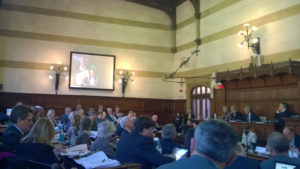Introduction

Full Council is of great legal importance since any decision made in the course of the period since the last Full Council meeting can only be classed as a recommendation until that decision has been ratified at a Full Council meeting be means of a councillor vote.
The meetings are held in public, so any member of the public can feel free to watch the proceedings and listen to how a particular debate for which they may have a special interest, plays out. If a member of the public would like to participate in a meeting then that is possible by previous arrangement. In the photo to the left is a deputation wanting to speak on the removal of funding of Breastfeeding Drop-
All councils will have space on their agendas for public participation. It will depend on the council’s Standing Orders, exactly how much time is allowed for the member of the public to speak, but that is also at the discretion of the Chairman. Standing Orders are the rules by which council business is run and have to be ratified at Full Council. At Hampshire County Council, the deputation will be allowed 10 minutes.
Hampshire Breastfeeding Counselling Deputation
On 18 February, a deputation related to the removal of Breastfeeding Centre funding. To support the deputation, a cross-
This was after the Deputy Leader of the Liberal Democrats had already expressed concern that the motion was being heard after the budget was to be voted on, since it was hoped that funding would be maintained for the Drop-
Sugar Tax Motion
The former Liberal Democrat opposition spokesperson for Public Health, Cllr Alan Dowden proposed a motion relating to Public Health England’s report on child obesity strategy;-
Proposed by Councillor Alan Dowden and seconded by Councillor Adrian Collett: “Hampshire County Council urges the Prime Minister, the Rt. Hon David Cameron MP, and the Sec. of State for Health, Jeremy Hunt MP, to release immediately Public Health England’s Review report on the child obesity strategy. Dr Sarah Wollaston MP, Chair of the House of Common’s Health Committee, has attacked the government’s decision to delay publishing the Review that was carried out in order to find ways of reducing the public’s sugar intake.
Hampshire County Council further seeks that the government;-
- Introduce, through parliament, a sugar tax to discourage the amount of sugar people consume.
- Implement legislation for clearer labelling of the sugar content in drinks and food products, as suggested by Jamie Oliver the celebrity chef when he gave evidence to the Parliament’s Health Select Committee.
These changes are essential for people to make informed choices and to counteract the impending damage to the public’s health and the resultant impact upon our health services.”
It was of no surprise that the Conservatives offered an amendment, which they could easily win, since they are in the majority. In effect they said the same thing, but removing the urgency for the completed report to be published. In the interests of cross-
County Budget 2016/17
Government has encouraged the setting of 0% council tax increase during the coalition years, but this year due to the wholesale reduction in government grants for which local authorities are heavily dependent, it was very likely that 0% increase was not going to be the option this year. The Conservative preference this year was to go for the maximum possible increase without invoking a referendum, which is 3.99%. It is well known that Hampshire has close to £500m in reserves of which in the order of £400m are earmarked, but this is still much more than the statutory minimum and so reflects the level of risk the administration is prepared to take in running our business. Even though, Government funding was 37.5% less than last year and to maintain last year’s rate would have meant increasing council tax by 28% (Not possible without a referendum), it was feasible to freeze council tax this year also.
The council must adopt an income generation strategy in future years, freeing it from the reliance of central Government. The Revenue Support Grant (RSG) will be phased out by 2020, by which time local authorities will take a share in the business rates of National Non-
